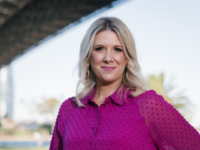As a keen sportswoman and adventurous soul, Gabby Samkova was always on the go as a teenager, heading from one activity to the next. “I would have various microfibre towels and cotton towels for the different activities – I wanted to create one towel that could be used for all activities”, Gabby says.
Then, whilst living in Bali for a year and a half where she worked a tour leader, Gabby took up surfing in her spare time.
“The immense plastic pollution I saw in Indonesia was beyond anything I had imagined, and I decided that if I was going to create this towel than I’d thought about, I wanted to be the solution and not the problem,” she explains.
Gabby researched materials and discovered it was possible to turn recycled plastic bottles into recycled polyester, the product most microfibre towels are made from.
This was the moment her venture, SomerSide, was conceived. Gabby’s towels are made from 85 per cent recycled plastic bottles, and each towel is made from eight to 14 plastic bottles that would otherwise have ended up in landfill and, ultimately, the ocean.
“Originally I did look into 100 per cent recycled material but, unfortunately, it was not as sturdy and didn’t have as much absorbency – a key element in a towel,” Gabby explains. “The blend allows SomerSide towels to be absorbent, to dry four times faster than a cotton towel and to be sand-resistant, while preventing plastic from ending up in our oceans.”
Beyond the raw ingredients that go into her towels, sustainability is at the core of the SomerSide brand and of the entire decision-making process, from production to delivering to consumers. “All SomerSide towels come in a pouch made from offcuts or leftover material so there is no waste,” Gabby says proudly. “The tags are made from recycled material, and there is no plastic used in the delivery process – consumers receive their towel in a biodegradable mailing satchel which means the entire consumer journey is plastic free.”
SomerSide is always looking at new ways to be more sustainable and its website carries a section on reuse ideas for the towels when people decide they’d like a new design, a decision prompted by a shift in consumer purchasing behaviour towards more conscious buying that Gabby has observed over the past few years. This shift is exemplified in the success of the crowdfunding campaign Gabby launched to fund the business.
“I raised $37,455 AUD in 30 days on Kickstarter to bring SomerSide towels to market – 360 backers from around the world believed the idea of using recycled plastic bottles for an all-in-one functional towel was one worth supporting,” Gabby enthuses.
The demand for SomerSide has grown significantly in the past year, with over 80 stores stocking the brand over Christmas and online sales tripling from the year before due, Gabby believes, to sustainability aspect of the product.
“I do think the pandemic has put a lot of everyday aspects of society under a microscope, where people are starting to think of the significant impact we have on the environment,” Gabby says. “The number of single use PPE that we will be cleaning out of the ocean and its impact won’t be truly seen for years and years to come.”
To combat these issues, Gabby asserts that every eCommerce business should be investing in biodegradable mailing satchels or recycled cardboard material for delivery. “It is easy to access now and is a small investment for businesses to truly help minimise plastic,” she says. “I think it’s also important to look at how much waste a business is producing.” Citing fast fashion as a particular problem area, Gabby believes the sector needs to consider how they can reuse all the garments that currently go to landfill, and switch their plastic poly bags to biodegradable ones.
This article first appeared in issue 32 of the Inside Small Business magazine.
















